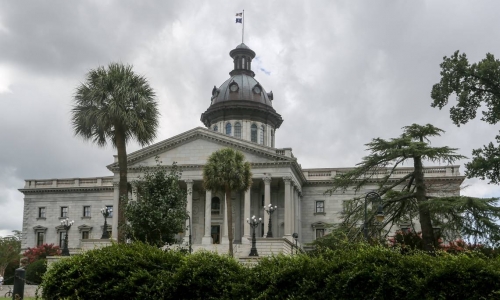Op-Ed: Not so happy Tax Day for Palmetto State residents
This piece was originally published in The Center Square, authored by Palmetto Promise President & CEO Ellen Weaver and Grover Norquist, President of Americans for Tax Reform.
South Carolina is among the nation’s top magnets for new residents in recent years because the Palmetto State is a great place to live. Yet South Carolina’s outdated tax code holds the state back in the national and global competition for new business, jobs, investment and people.
Tax Day is a great time to consider the fact that South Carolinians face the highest income tax rate in the region, and the state falls further behind every year this flaw goes unaddressed by state legislators in Columbia.
South Carolina holds the dubious distinction of being home to the highest personal income tax rate in the south, with a top rate of 7% applying to most income, as it kicks in at just over $15,000 in income for both single and joint filers. This dishonor used to belong to North Carolina, but Tar Heel State legislators took decisive action eight years ago to change that. What’s happened north of our border shows how much progress can be made with smart policy in a short period of time.
As a result of North Carolina’s successful tax reform efforts, that state’s income tax has been smartly and systematically reduced, with the top rate cut from 7.75% to a flat 5.25%. This is now the lowest income tax rate in the Southeast, besides Tennessee and Florida, which do not tax income at all. North Carolina’s corporate income tax rate was 6.9% in 2013 but since has been cut to 2.5% and is the lowest corporate income tax rate in the nation (excepting Wyoming and South Dakota, which do not levy a corporate tax).
The results speak for themselves: a growing economy, hundreds of thousands of new jobs, and surpluses that have funded teacher pay raises, replenished rainy day funds and, most importantly, been used to cut tax rates even further for individuals, families and businesses.
North Carolina is not the only neighboring state that has improved its tax code in recent years. Georgia long has had a lower personal income tax rate than South Carolina, but lawmakers in Atlanta increased their state’s advantage when they approved an income tax rate cut in 2019, bringing the rate from 6% down to 5.75%. Before adjourning the recently concluded legislative session, Georgia legislators approved another round of income tax relief in the form of a standard deduction increase.
In the two no-income-tax states in the region – Florida and Tennessee – lawmakers continue to find ways to increase their already sizable competitive advantage over South Carolina. Rick Scott signed a tax cut into law in each of the eight years he was governor of the Sunshine State and more tax relief is working its way to Gov. Ron DeSantis’ desk this session.
Tennessee long has been a state with no tax on wage income, but Volunteer State lawmakers made Tennessee a true no-income-tax state this year with the completion of a multiyear phaseout of the state’s tax on investment income, which officially zeroed out Jan. 1. Gov. Bill Lee and legislators in Nashville aren’t resting on their laurels. A bill to do away with Tennessee’s professional privilege tax, which applies to seven occupations and is the last vestige of an income tax in that state, is on track for passage later this spring.
In addition to providing welcome relief to individuals, families and employers from the Lowcountry to the Upstate, income tax rate-reducing reform also would increase the job-creating and sustaining capacity of small businesses, the majority of whom file under the individual income tax system. In fact, according to IRS data, more than 380,000 South Carolina sole proprietors file under the individual income tax system and would benefit from a personal income tax rate cut, as would more 121,000 partnership and S-corp owners.
Inaction is not a neutral position. By doing nothing, South Carolina’s disadvantage relative to states such as North Carolina is set to grow, as legislators in Raleigh recently introduced the next phase of income tax relief with a bill that would cut the state income tax rate once again from 5.25% to 4.99%.
If South Carolina lawmakers don’t put their foot on the gas to improve the state tax code and enact much needed income tax relief, our state will be lapped by the competition, and it’s hard-working taxpayers who will be eating their dust. It’s time to get South Carolina back in the race with proven tax policies we know will put us in victory lane.
Ellen Weaver is president of the Palmetto Promise Institute, a Columbia-based think tank. Grover Norquist is president of Americans for Tax Reform, a nonprofit taxpayer advocacy organization founded in 1985 at the request of President Ronald Reagan.




